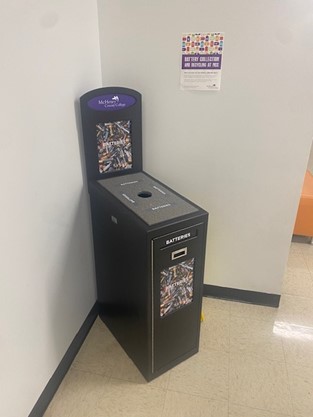Green Campus Initiatives
-
Re-Use It Corner
- The Re-Use-It Corner is a collection of gently used school and office supplies available for free to students and staff at MCC. It can be found in A133B along with the Sustainability Center. Look for the purple sign in the hallway.
- Donations of supplies including binders, staplers, file folders, notebooks, desk organizers, and more are gratefully accepted from MCC staff and students. The community is encouraged to donate as well by appointment only. However, we can’t accept electronics or any item with a power cord. Contact the Sustainability Center to arrange drop off.
- Since its inception in 2018, $99,840 has been saved and 21,876 items reused. 1,870 visitors have donated or reused items since 2021.

-
Composting on Campus
Partnerships and Collaboration MCC started composting food scraps in April 2019. MCC collects food scraps from the Café, the commons and the culinary classes daily. Compost is stored on the loading dock and picked up once a week. MCC has a contract with WasteNot to measure and track our compostable items.
MCC started composting food scraps in April 2019. MCC collects food scraps from the Café, the commons and the culinary classes daily. Compost is stored on the loading dock and picked up once a week. MCC has a contract with WasteNot to measure and track our compostable items.
-
MCC Café: This effort helps the MCC Café earn their third green star from Green Restaurant Association. MCC Café is one of only a few community college dining facilities with three green stars!
-
MCC Sustainability Center: This effort exemplifies MCC's commitment to sustainability and furthers progress toward our long-term goal to decrease our waste stream.
Where does it go?
- In 2023, MCC began a partnership with WasteNot, a company that recently started compost collection in McHenry County. From May 2023 through October 2024, we diverted 8,209 pounds of food waste away from landfills saving 368 gallons of gas, or 8,143 miles of driving.
What is collected and considered "compostable"?
- Any leftover food from the café, diner’s paper plates and napkins as well as food scraps from the culinary classes, parties, and events at MCC.
- The college is using some compostable plastic items as well.
Why is MCC doing this?
- MCC’s waste stream is over 70% food scraps and organic waste.
- By decreasing the volume of our waste stream, we reduce our garbage collections, saving the college funds and decreasing our carbon footprint.
- Food waste in landfills creates a harmful greenhouse gas, methane, which is dangerous to the Earth’s atmosphere. Unlike landfills, when this same waste is composted above ground, oxygen helps decompose it aerobically, producing almost no methane.
Benefits of composting
- Enriches soil, helping retain moisture and suppress plant diseases and pests.
- Reduces the need for chemical fertilizers.
- Encourages the production of beneficial bacteria and fungi that break down organic matter to create humus, a rich nutrient-filled material.
- Lowers methane emissions from landfills and minimizes carbon footprints.
-
-
Three Green Star MCC Café
The MCC Café has earned a Level 3 Green Restaurant Certification from the Green Restaurant Association!
The Green Restaurant Association’s (GRA) standards reflect 25 years of research in the field of restaurants and the environment. The purpose of the GRA standards is to provide a transparent way to measure each restaurant’s environmental accomplishments, while providing a pathway for the next steps each restaurant can take towards increased environmental sustainability.
GRA certification is made up of over 500 environmental standards, with each standard earning a restaurant a certain number of GreenPoints™ towards becoming a Certified Green Restaurant®. The GRA has assessed the relative environmental impacts of each step to determine the number of GreenPoints™ each step earns. The standards are classified into seven categories:
- Water Efficiency
- Waste Reduction and Recycling
- Sustainable Durable Goods & Building Materials
- Sustainable Food
- Energy
- Reusables & Environmentally Preferable Disposables
- Chemical and Pollution Reduction
MCC’s Food Services Department was assessed through 46 steps and earned enough points to meet the standard for three green stars (the highest rating possible for this category). MCC is the first community college food service program in the country to receive a Green Restaurant Certification and only the second business in McHenry County to receive this certification. The Office of Sustainability was proud to partner with Chef Kurt Kurlek and his staff through this process to further implement sustainable initiatives on campus.
For more information on the green Restaurant certification process, visit the Green Restaurant Association website at www.dinegreen.com/certification-standards.
For more information about additional sustainability efforts at McHenry County College, please visit www.mchenry.edu/green.
-
2024-2025 MCC Sustainability Committee Members
- Chair: Kim Hankins, Director of Sustainability
- Archna Goyal, Instructor, Biology
- Colin Jaeger, Instructor, Biology
- Dominic Lorann, New Student Enrollment Coach
- Emily Akin, Testing Center Coordinator
- Emily Zack, Center for Agrarian Learning
- Kate Kramer, Instructor, Earth Science
- Leslie Krebs, Advisor
- Silvia Schmid, Instructor, Languages
-
Grant-funded Projects
- The Illinois Green Economy Network (IGEN) funded a $24,450 lighting replacement project. Approximately 200 LED fixtures and accompanying hardware were purchased and installed between July 1, 2023 – June 30, 2024. These energy efficient fixtures were primarily installed in classrooms and hallways in building A. This resulted in a 61% reduction in energy usage when compared to the prior year.
- IGEN also partnered with the MCC HVAC program and the Workforce Development Program to develop and teach credit and non-credit HVAC Curriculum and training. These new courses are in response to new regulations from the US EPA. The new regulations require the use of a new non-toxic and lower global warming potential refrigerant.
- An additional IGEN grant will be used for professional development opportunities for staff and students.
-
Electric Vehicle Charging on Campus
MCC currently has four electric vehicle charging stations at the main campus. Two are located near the end of the F Building (Leibman Science Center) and two are near the entrance to the B building. There is no charge to use these stations. Currently there are plans to install eight more stations in Fiscal Year 2025.
-
Battery Recycling on Campus
 Starting in spring of 2024, the Sustainability Center introduced a new battery collection and recycling program. Battery collection and recycling is now available for all students and staff on the Main Campus. Students and staff can recycle AA, AAA, C, and D batteries in one of the six bins across campus. The bins were funded by the Lou Marchi Total Recycling Institute and are made from recycled plastic milk jugs. Collection bins can accept both alkaline and lithium batteries. Any batteries not accepted in collection bins can be properly disposed of by locating a drop-off location in the Green Guide or by contacting the Sustainability Center.
Starting in spring of 2024, the Sustainability Center introduced a new battery collection and recycling program. Battery collection and recycling is now available for all students and staff on the Main Campus. Students and staff can recycle AA, AAA, C, and D batteries in one of the six bins across campus. The bins were funded by the Lou Marchi Total Recycling Institute and are made from recycled plastic milk jugs. Collection bins can accept both alkaline and lithium batteries. Any batteries not accepted in collection bins can be properly disposed of by locating a drop-off location in the Green Guide or by contacting the Sustainability Center. -
Other Recycling on Campus
The Sustainability Center utilizes several TerraCycle Products to help reduce and upcycle waste. TerraCycle transforms discarded items into raw materials, selling them to manufacturers who create new products which completes the recycling journey.
At the Main Campus, all Keurig-style coffee brewers are required to have a coffee capsule collection box. There are nine total boxes around campus, all managed and funded by the Sustainability Center. Once the boxes are full, they are sealed and shipped to TerraCycle. Coffee grounds are separated and composted and the plastic and aluminum are cleaned and sold to be used as raw materials.
The Sustainability Center also offers two TerraCycle boxes for students and staff to make drop-offs in our Re-Use It Corner. The Center offers a candy and snack wrapper waste box that accepts any flexible plastic-based candy and snack packaging and wrappers. This collection box is also available on-request for campus events. The Center also offers a pen, pencil, and marker waste box.
- LEED Buildings at MCC
